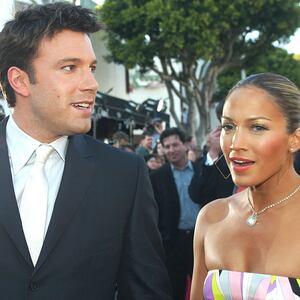It’s been 23 years since Good Will Hunting, the first produced screenplay penned by the writing team of Ben Affleck and Matt Damon, took home Best Original Screenplay at the Academy Awards. Since then, the pair of longtime Boston pals have transformed into Hollywood superstars, with the former winning Best Picture for his directorial effort Argo and the latter turning in a number of celebrated performances, from The Talented Mr. Ripley to the Bourne series of films.
On Friday afternoon, Affleck and Damon appeared at a Venice Film Festival press conference to discuss The Last Duel, a new Ridley Scott film they penned (with the help of Nicole Holofcener) and are headlining. The setting is 14th century France, and, after Marguerite de Carrouges (Jodie Comer) has been raped by Jacques Le Gris (Adam Driver), the best friend of her husband/knight Jean de Carrouges (Matt Damon), she heroically comes forward to report the claim—leading her husband to challenge Le Gris to trial by combat. Affleck plays Count Pierre de d’Alencon, a nobleman and the film’s scheming villain.
When asked about consent and toxic masculinity—and whether he considers himself a feminist—Affleck replied, “Yes, I do consider myself a feminist. And this movie principally was really exciting to me because of the character of Marguerite—her extraordinary strength and bravery seemed very obvious when I read the book.”
“And also, it was a true story that people didn’t know,” he continued. “This was an incredible woman from history who is an early known recorded person who spoke out against a powerful man who assaulted her. Naturally, that seemed relevant—and also incredibly thrilling, and a story that could generate a lot of catharsis and empathy, and one that I hoped would develop in the viewer a sense of compassion and, we hope, the idea that we might look at one another in a different way.”
Scott said that he agreed to the project in Christmas of 2018, and Damon and Affleck produced the screenplay six weeks later. While Damon and Affleck wrote the sections of the film focused on the men, Holofcener was in charge of the third act, which is more focused on Marguerite’s courage in the face of deep misogyny. As the action in The Last Duel is seen from the differing perspectives of the three central characters, with Marguerite’s version being the truthful one, Scott drew comparisons to Kurosawa’s Rashomon.
Comer, for her part, explained that it was her mission “to make sure this woman was fully fleshed out, and she had this experience but wasn’t defined by it.” She went on to say that she found it refreshing that she was given a voice in the process of shaping the character—and film.
“It’s a story that wasn’t just an indictment of one bad person but pointed to the cultural antecedent that Europe—and countries colonized by European countries—share, which is one that didn’t view women, for many, many centuries, as human beings,” Affleck stated. “And in fact, many residual aspects of that perspective remain.”







